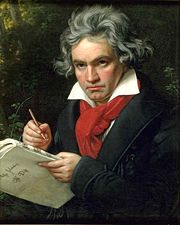
Beethoven was quite fond of his Wine
Aside from Beethoven’s well-known drinking habits, and Mozart’s love affair with wine bottles as “romanticized” in Peter Shaffer’s
Amadeus (1984), few people realize how great a
role wine has played in the history of Western classical music. During the late 16th to early 18th century, over 250 books containing “Serious” and “Drinking Songs” were published in Paris, not to mention the rest of Europe. Many of these drinking songs, as you can imagine, are quite humorous. Even opera is not free from references to the drink! Take, for example, Verdi’s exuberant “Drinking Song” from
La Traviata! There even exists a comical CD entitled
Opera’s Greatest Drinking Songs! The classical masters are known to have frequently indulged in the good stuff of life, including wine. In addition to Berlioz, Brahms, Debussy, and Lizst, Tchaikovsky relied on wine to ease his troubled nerves, Mussorgsky was rarely found without a glass in hand, Erik Satie enjoyed wine for its simple pleasure, Jean Sibelius spent large sums of money on gourmet dinners and fine wines, and the list goes on. While some composers chose to write humorous music about stimulants--have a listen to J. S. Bach’s
Coffee Cantata--a great body of secular music written by the classical masters includes direct or indirect references to wine and spirits. Ponder this the next time you hear Carl Orff’s famous
Carmina Burana, used in many Hollywood movie previews, which is primarily a setting of medieval drinking tunes!

 Beethoven was quite fond of his Wine
Beethoven was quite fond of his Wine